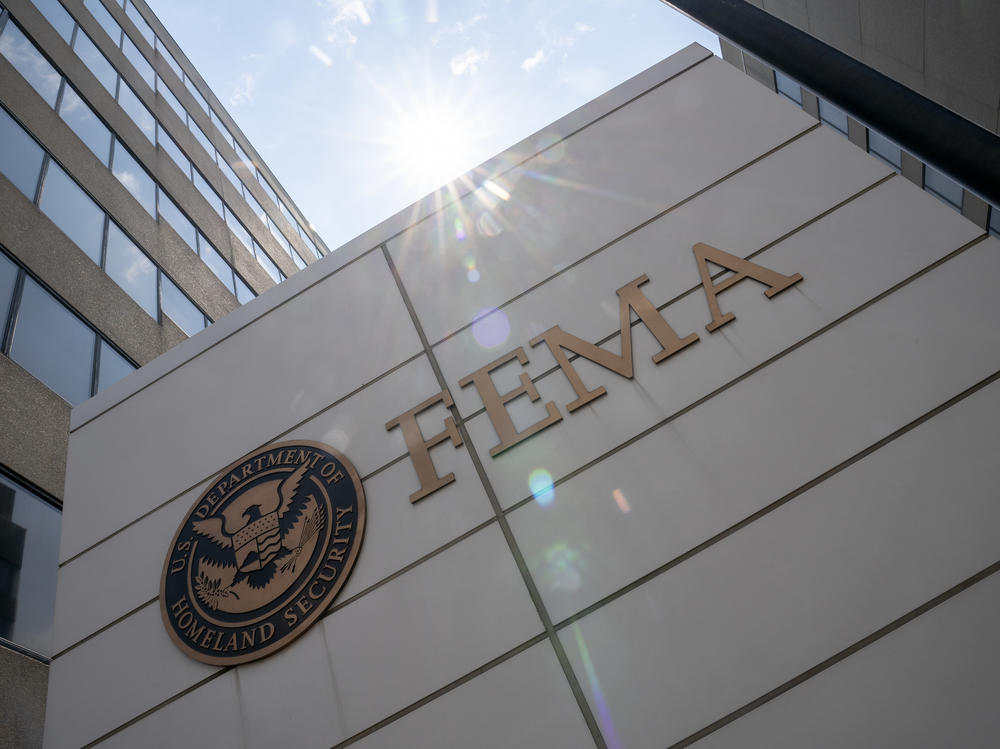Section Branding
Header Content
FEMA Says It Will Stop Paying For Cloth Face Masks For Schools
Primary Content
Updated 12:42 p.m. ET Wednesday
The Federal Emergency Management Agency said it will no longer pay for some safety measures related to COVID-19 that it had previously covered.
Keith Turi, FEMA assistant administrator for recovery, announced the changes during a call Tuesday with state and tribal emergency managers, many of whom expressed concerns about the new policy.
Under the new guidance, FEMA will generally not reimburse states for the costs of cloth face coverings or personal protective equipment in nonemergency settings, including schools, public housing and courthouses. The policy goes into effect on Sept. 15.
The changes narrow what constitutes an "emergency protective measure" and is thus eligible for FEMA's Public Assistance Program.
A recording of the call was provided to NPR by a government official responsible for emergency funding. The official is not authorized to speak to the media and is concerned about a possible job loss for doing so.
Going forward, Turi explained, cloth face masks and personal protective equipment in nonemergency settings will be classified as "increased operating costs" for public services and will not be covered by the fund.
"Supporting schools and other functions — courthouses and other related functions — are not a direct emergency protective measures and therefore they're not eligible for [public assistance]," Turi said on the conference call.
A range of federal assistance related to the pandemic is being made available from different sources, he noted, pointing to a Department of Health and Human Services program that will distribute up to 125 million cloth face masks to schools.
Turi acknowledged there are many increased operational expenses related to COVID-19 being incurred at the state and local level during this time, but they do not meet FEMA's definition of direct emergency protective measures and thus don't qualify for the public assistance fund.
FEMA said it will still provide personal protective equipment, including cloth face masks, for medical care, some medical sheltering, mass casualty management and other settings.
There was immediate consternation among the government officials on the call.
One state government official from the Midwest sought clarity on how the new regulations would relate to providing protective gear to teachers and schools.
"Once an outbreak has occurred, then if we provide PPE that would be eligible, but not prior to?" the official asked. "Is that correct?"
Turi replied that cloth face coverings or protective gear for teachers and schools "are not eligible because they are related to the operating of the facility."
"Even though teachers that on Aug. 18 were identified by [the federal government] to be essential workers?" the state official asked.
"There are costs that are being incurred and required based on COVID, but they are not necessarily all emergency protective measures, and they're not necessarily all FEMA-eligible," Turi replied.
An official from a Southern state voiced a broader concern about what the withdrawal of FEMA funding for face masks would mean for ongoing efforts to stop the spread of the coronavirus.
"Two of the biggest things we can do to stop the spread of COVID-19 are social distancing, which we're having to learn to work around, so that we don't have education loss, which can border on catastrophic. And the next thing they can do is wear a face mask," the official said.
He also wanted to know if masks that had been ordered for schools in his state but might not be received for months would be covered.
Turi replied that he could not speak to specific cases and that the state official should work with regional FEMA officials.
It's not only face mask funding that will be affected.
FEMA will stop paying for cleaning and disinfection costs unless they are considered an emergency protective measure, Turi said.
Another change: As of Sept. 15, FEMA will only provide stockpiling funding for a 60-day supply of personal protective equipment from the date of purchase. Previously, a specific date was not specified.
Some states may face a budget crunch as they try to carry out the protective measures necessary to reopen schools and other aspects of society. The FEMA policy is not retroactive, so it could lead to a swift stockpiling during the next two weeks as states rush to get purchases in under the wire.
Copyright 2020 NPR. To see more, visit https://www.npr.org.

